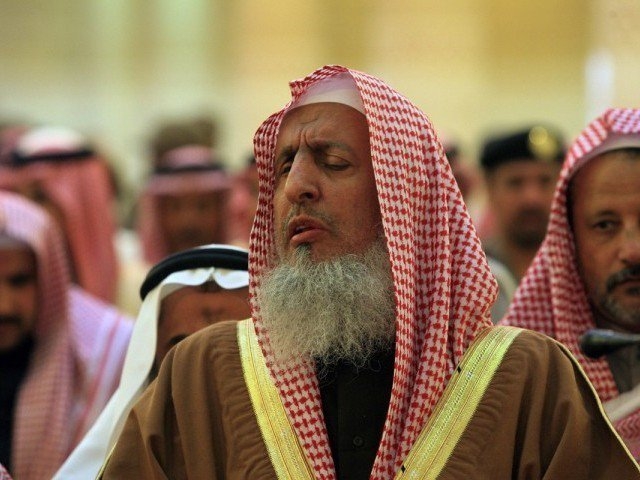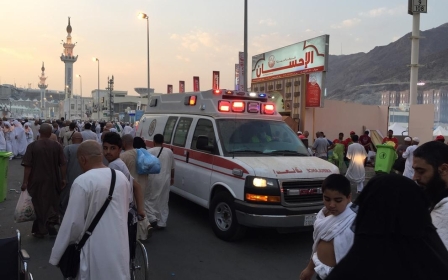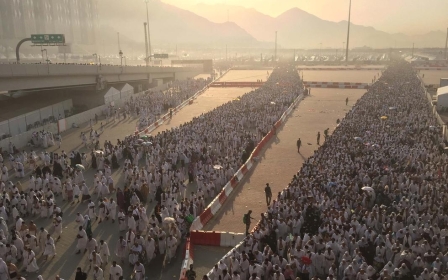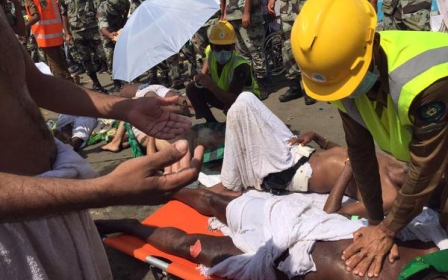Hajj stampede beyond human control, says top Saudi cleric
Saudi Arabia's grand mufti says hajj stampede killing hundreds was beyond human control

A file photo of Saudi Arabia's Grand Mufti Sheikh Abdul Aziz al-Sheikh (AFP)
Published date: Samedi 26 septembre 2015 - 17:25
|
Last update: 9 années 2 mois ago
Saudi Arabia's top religious leader says a stampede which killed 717 pilgrims was beyond human control, official media reported on Saturday, the final day of this year's hajj.
The stampede was the worst disaster in a quarter-century to strike the annual event and drew fierce criticism of the Saudi authorities' handling of safety, particularly from regional rival Iran.
"You are not responsible for what happened," Sheikh Abdul Aziz al-Sheikh told Crown Prince Mohammed bin Nayef in a meeting in Mina on Friday, the official Saudi Press Agency (SPA) reported.
"As for the things that humans cannot control, you are not blamed for them. Fate and destiny are inevitable," Sheikh told the prince, who is also minister of interior.
Mohammed chairs the Saudi hajj committee and has ordered an investigation into Thursday's stampede during a symbolic stoning of the devil ritual by hundreds of thousands of pilgrims at Jamarat Bridge in Mina, just outside the holy city of Mecca.
King Salman, whose official title is "Custodian of the Two Holy Mosques" in Mecca and Medina, also ordered "a revision" of how the hajj is organised.
On Saturday, groups of pilgrims were moving from early morning towards Jamarat Bridge for the last of three stoning days.
The interior ministry has said it assigned 100,000 police to secure the hajj and manage crowds.
But pilgrims blamed the stampede on police road closures and poor management of the flow of hundreds of thousands of pilgrims in searing temperatures.
Abdullah al-Sheikh, chairman of the Shura Council, an appointed body which advises the government, stressed that pilgrims must stick to "the rules and regulations taken by the security personnel... In doing so they protect their lives, their security and facilitate their performing of the rituals."
Health Minister Khaled al-Falih earlier made similar remarks that faulted the worshippers.
'Biased campaigns'
In comments carried late Friday by SPA, the Shura chairman called on citizens and Muslims to ignore "the biased campaigns carried out by the enemies of this pure country, to question the great efforts exerted by the kingdom to serve the holy sites, their construction and expansion, and to serve the visitors and pilgrims."
Riyadh's regional rival Iran said 131 of its nationals were among the victims, and on Friday stepped up its criticism of the kingdom, demanding that affected countries have a role in the Saudi investigation into the disaster.
"Saudi Arabia is incapable of organising the pilgrimage," said Ayatollah Mohammad Emami Kashani, leading the main weekly prayers in Tehran.
"The running of the hajj must be handed over to Islamic states," he said.
Several African countries confirmed deaths in the stampede, as did India, Indonesia, Pakistan and the Netherlands. Moroccan media gave 87 nationals killed.
Nigeria's President Muhammadu Buhari urged King Salman "to ensure a comprehensive and thorough exercise that will identify any flaws in hajj organisation".
Buhari said his country had lost a prominent journalist, a professor "and others" in the tragedy.
Largely incident-free for nine years after safety improvements, this year's hajj was afflicted by double tragedy.
Days before it started, a construction crane collapsed at the Grand Mosque, Islam's holiest site, killing 109 people including many foreigners.
The hajj is one of the five pillars of Islam, which each of the world's more than 1.5 billion Muslims is expected to perform at least once in his or her lifetime, as long as they are capable.
Middle East Eye propose une couverture et une analyse indépendantes et incomparables du Moyen-Orient, de l’Afrique du Nord et d’autres régions du monde. Pour en savoir plus sur la reprise de ce contenu et les frais qui s’appliquent, veuillez remplir ce formulaire [en anglais]. Pour en savoir plus sur MEE, cliquez ici [en anglais].




